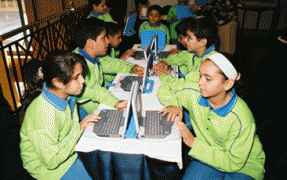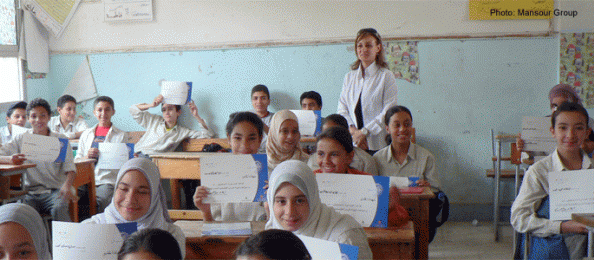Building Social Wealth through Education
About one out of every three Egyptians above the age of 15 cannot read or write. Despite various efforts of national literacy initiatives, as well as those organized by the many nongovernmental organizations and private enterprises operating in the country, Egypt still ranks 132nd worldwide in terms of literacy.
Although the need for education is explicitly stressed only in Article 26 of the Universal Declaration of Human Rights, we observe that without education, it is impossible for individuals to know, declare, and claim all other human rights to which they are entitled. It is no accident that H.G. Wells declared history to be a race between education and catastrophe. It is a race, and it is one that we cannot afford to lose.
It is by this logic, and with a resolve forged within that conviction, that The Mansour Group has committed itself to the development of education as a vital social resource. This is also why, day after day, we try to find the means by which we can help empower the growing minds of our nation with the desire to know.
Even before formalizing this commitment with the United Nations Global Compact, we at Mansour prided ourselves on our dedication to fair practices, to the transparency of our interactions, and to the social welfare of our community. Furthermore, the framework of the Global Compact has provided us with additional opportunities to collaborate with like-minded people and organizations – all with a clear intent to improve our social environment and the lives of our children.
Mansour has had a long history of social commitment
We decided to get involved with the SKOOOL project several years ago. The idea – as many great ones tend to be – seems simple enough in retrospect; the constant content availability provided by the Internet and the ongoing proliferation of the Internet in Egypt would provide a channel ideally suited to function as an educational platform. SKOOOL does just that by providing an online presence that allows educational content to be distributed through a simple, accessible interface that is available to anybody, anywhere, on demand.

SKOOOL is now used to provide online users of all ages with access to the entire Egyptian curriculum for all school grades, both primary and secondary. The SKOOOL website was launched in late 2008, and in the first year alone we have seen it serve over 300 thousand visitors who have accessed almost 2.5 million pages of educational content. We have been very excited to observe the number of monthly visitors to the site grow from 10,000 in November 2008 to over 60,000 by November 2009.
Each one of those SKOOOL visits represents a moment where somebody somewhere – at home, at a school, or maybe even at an Internet café – has logged on to the site and made a conscious choice to learn. These moments are very precious to us, and each and every single one of them represents a stepping stone to a better future for our children, our society, and our country.
Another program that we have been very excited to take part in is the addition of Intel PC Classmate computers to public schools in Egypt. The Intel Classmate PCs, like those of the One Laptop Per Child program, are ideal for school environments. They are portable and rugged, and their interface is specifically designed to make them fun and easy for children to use. They provide a great platform and provide teachers with the means to distribute digital content to students while providing children with real-world computing and software skills. They are also trouble-free for school administrators, since they require minimal setup and maintenance requirements and come preloaded with education-focused software.
By the end of 2009, The Mansour Group had contributed over 350 Classmate PCs, 11 carts, and 11 smart boards to 6 public schools – bringing the digital education platform to over 1,500 students. This was done in collaboration with the INJAZ (Arabic for achievement) initiative through the Save the Children Program.
The benefits of the Classmate project for students are twofold; on the one hand, students who might not have had the chance to gain familiarity with computers and their operating systems are introduced to digital technology through a hardware platform designed specifically to ease that path, and they are in turn empowered to access and make use of the online SKOOOL program along with all its associated benefits.
Although these projects are powerful initiatives in and of themselves, they also naturally complement each other and provide students with not only the educational content they need but also the means by which to access that content.
Through INJAZ, employees of Mansour, along with those of other companies, volunteer one hour of their time every week to go to public schools and teach the children basic skills, thereby providing the students with practical life experience and working skills. INJAZ also coordinates and supervises the placement of the Classmate PCs in the schools and are therefore able to ensure proper monitoring and reporting of their usage by the students and the progress of the project as a whole. The volunteers also make use of these PCs in order to teach children and aid in their education.
Nothing should stand between a student’s thirst for information and the means of acquiring it.
We hope to participate in the creation of a society that is not only knowledgeable but also intimately comfortable with information technology. We hope to see a society that is ultimately empowered to discover, create, and diffuse even more knowledge.
In the right environment, students quickly learn a wonderful lesson that often fills them with awe: that education, that the actual act of learning, is not merely useful, but is also a great pleasure and an excitement of thought and understanding, a splendor in and of itself.
We know this about education: that it is necessary; that it is vital; that it is the foundation on which nations are built and without which they come to ruin; that a mind exposed to knowledge yearns for more of it, seeks more of it, creates it, and flourishes with it; that once touched by education, a mind will forever awaken and never again rest, will always question, and never tire. It is with great pleasure that we aid in this process, and it has been more rewarding than we could ever have imagined.
Working on education has been, and continues to be, an absolute delight.
Facts
The core business today of the Al-Mansour Holding Company for Financial Investments is focused on the manufacture and distribution of FMCGs (Fast Moving Consumer Goods) as well as electronics, retailing, and services. It employs over 7,000 people and has an annual turnover of more than $1 billion. It is affiliated with international companies and also manufactures its own labels. The Al-Mansour Holding Company was one of the pioneering companies to join the UN Global Compact in Egypt in 2003. It has shown great commitment to the Principles and has acted as a major advocate for the Global Compact and corporate social responsibility in the country. In 2008, the Mansour Group became a focal point for the Global Compact in Egypt.
This project description was originally presented in the Global Compact International Yearbook 2010.
Mr. Nagi is Regional Network Manager MENA and Europe at the UN Global Compact.


